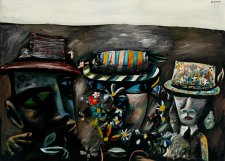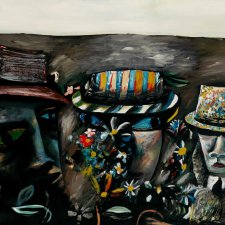Judith Wright (1915–2000), poet, conservationist and Aboriginal land rights campaigner, is one of Australia's most celebrated literary voices. After studying English at the University of Sydney, she travelled in Europe before settling in Sydney to write. She wrote 'an occasional modest, thoughtful poem', but when Japan entered the war, she returned to help on the family property near Armidale, NSW. Rediscovering her love of the countryside led to an intensely creative period of writing. Her first major volume of poetry, The Moving Image (1946) was said to have 'brought a sense of excitement and anticipation to the Australian literary world of the time'. It was followed by many others, including Woman to Man (1949), which won the Grace Leven Prize for Poetry. She also wrote novels, short stories, children's stories and literacy criticism. A conservationist, Wright co-founded the Wildlife Preservation Society of Queensland and was president from 1964 to 1976. Through the 1960s and early 1970s she was devoted to protecting the Great Barrier Reef from oil drilling and campaigned against land mining on Fraser Island. The Canberra suburb 'Wright' is named after her.
Jacqueline Mitelman’s portrait of Wright was included in her book Faces of Australia (1988), a survey of 120 of Australia's most prominent personalities. Wright's composure and determination is evident as she stares out at the viewer.
Purchased with funds provided by Jillian Broadbent AC 2021
© Jacqueline Mitelman
Jillian Broadbent AC (7 portraits supported)



On one level The Companion talks about the most famous and frontline Australians, but on another it tells us about ourselves.



Australian photographer, Jacqueline Mitelman, discusses her process for creating portraiture.



Dr. Sarah Engledow explores the context surrounding Charles Blackman's portrait of Judith Wright, Jack McKinney and their daughter Meredith.